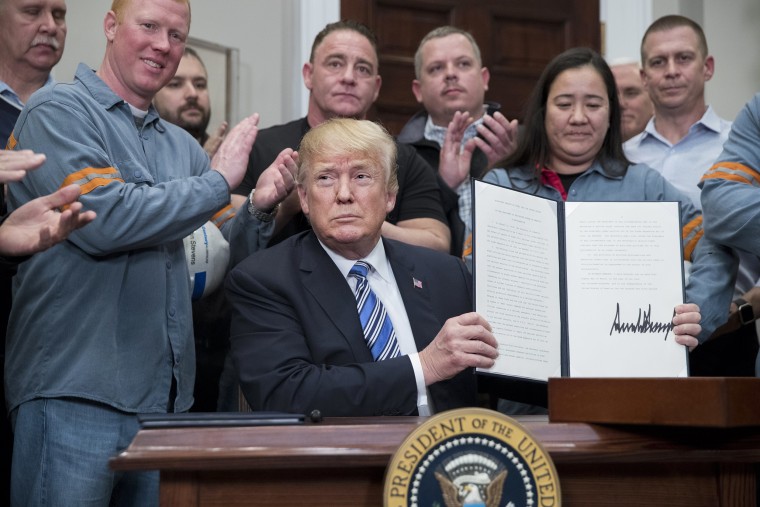First Read is your briefing from Meet the Press and the NBC Political Unit on the day's most important political stories and why they matter
WASHINGTON — Thursday was Vintage Trump. In the span of a few hours, President Trump and the White House announced 1) new tariffs on steel and aluminum (with exceptions for Canada and Mexico), and 2) that they had accepted an invitation to meet face-to-face with North Korea’s Kim Jong Un.
The moves were bold, brash and big. But they also were two breathtaking gambles that could pay off — or could prove to be costly for the United States.
On tariffs, Trump’s action appeared more to fulfill a campaign promise and have a deliverable to take to the Pittsburgh area on Saturday, when he campaigns for Republican Rick Saccone in the upcoming PA-18 special election. (If it was purely about protecting the steel industry, why exempt Canada, which is the biggest steel exporter to the U.S.?)
But the gamble here is that Trump’s move would spark a trade war with the rest of the world, which could drive up prices on goods — cutting into the benefits of the recently passed tax law.
On North Korea, the news “provides a chance to resolve the state of war that has divided the Korean Peninsula since the 1953 armistice, and eliminate the threat of a nuclear conflict, plus Kim's promise to halt missile and nuclear tests while talks are underway,” NBC’s Andrea Mitchell writes.
But the gamble here is if the Trump administration is getting played – and is elevating Kim Jong Un in the process. “North Korea has been seeking a summit with an American president for more than twenty years. It has literally been a top foreign policy goal of Pyongyang since Kim Jong Il invited Bill Clinton,” arms-control expert Jeffrey Lewis tweeted. “I wonder if Trump's ‘aides’ have explained that to him.”
The Washington Post adds, “Just by sitting down with President Trump, Kim Jong Un will get what he craves the most: legitimacy. He wants to be treated as an equal by the global superpower, and a photo opportunity with the most powerful leader in the free world will go a long way to helping him achieve that.”
In the short term, both moves are neutral to good news for a Trump White House that had been dealing with problematic stories (Mueller, Gary Cohn’s departure, Hope Hicks’ exit, Jared Kushner’s security clearance). And you could see how they could give the president a bounce in his step when he stumps Saturday in the Pittsburgh area. Bottom line: They help him turn the page on a rough last couple of weeks.
But in the long run, do they pay off? Or do they backfire?
Who are the North Korea experts working in this White House?
The North Korea talks mean that Trump has to keep National Security Adviser HR McMaster, right? MSNBC’s Nicolle Wallace reported that the White House has been preparing to replace McMaster as early as in April. Well, it would be VERY hard to do that now. Also, there is no ambassador to South Korea or any real North Korean experts working inside the White House. Who on Trump’s team has experience in knowing how to deal with North Korea and Kim Jong Un?
Trump’s tariff plan finds support with red-state Democrats and opposition from Republicans
NBC’s Andrew Rafferty: “President Donald Trump’s tariff announcement Thursday divided the Republican Party but found support in some unlikely allies — red state Democrats. Vulnerable Democrats up for re-election in November like Pennsylvania’s Bob Casey, West Virginia’s Joe Manchin and Wisconsin’s Tammy Baldwin have been mostly receptive to Trump’s plan to slap a 25 percent tariff on imported steel and 10 percent tariff on aluminum. Each represent states where Trump’s message on manufacturing and trade resonated in 2016. Meanwhile, a number of high-profile Republicans, like House Speaker Paul Ryan, have come out strongly against the change.”
Power struggle inside the Department of Veterans Affairs
On any other day and in any other administration, this would be big news: “Veterans Affairs Secretary David Shulkin is managing the government’s second-largest bureaucracy from a fortified bunker atop the agency’s Washington headquarters,” the Washington Post says.
“He has canceled the morning meetings once attended by several of President Trump’s political appointees — members of his senior management team — gathering instead with aides he trusts not to miscast his remarks. Access to Shulkin’s 10th-floor executive suite was recently revoked for several people he has accused of lobbying the White House to oust him. He and his public-affairs chief have not spoken in weeks. And in a sign of how deeply the secretary’s trust in his senior staff has eroded, an armed guard now stands outside his office.”
Why is the GOP spending so much money in a PA-18 congressional district that won’t exist in November?
The New York Times’ Jonathan Martin tries to answer the question: “If [Democrat Conor] Lamb, a Marine veteran and a former federal prosecutor, defeats State Representative Rick Saccone, a Republican, in a district that the president carried by 20 points, the alarm bells will be audible across the country. The Democrats will have shown that they can breach the Republican hold on the blue-collar white voters who helped deliver Mr. Trump the presidency.”
But a Republican involved in the race offers another reason — the goal is to damage Lamb for November, win or lose on Tuesday. "So if we pull out, Lamb's fav/unfavs stay high," the Republican said. "So we need to wound him for the fall."
Pennsylvania's new congressional map drew Lamb's hometown into Rep. Keith Rothfus', R-Pa., district, and it's much less GOP-leaning than the current PA-18. And the expectation is that Lamb will challenge Rothfus.
